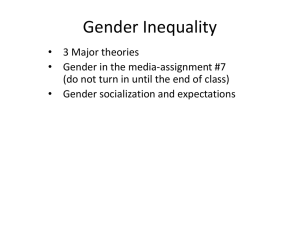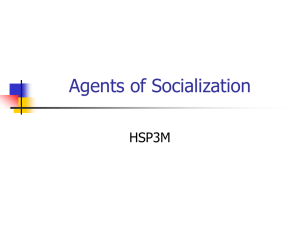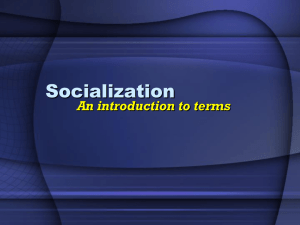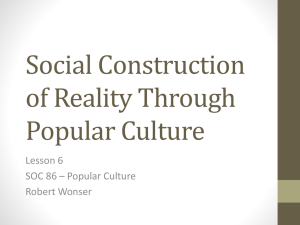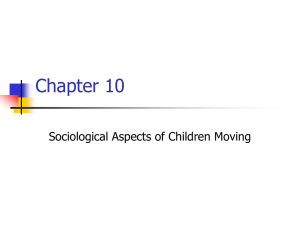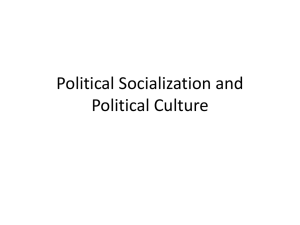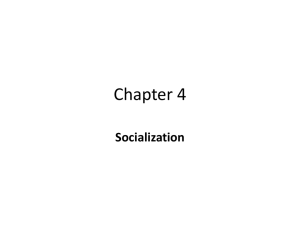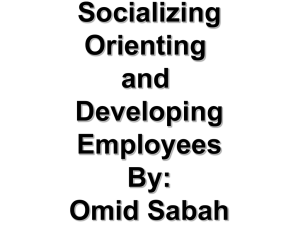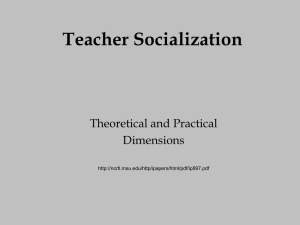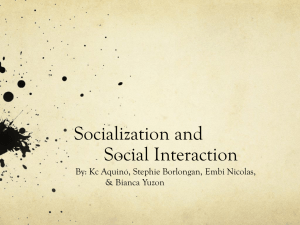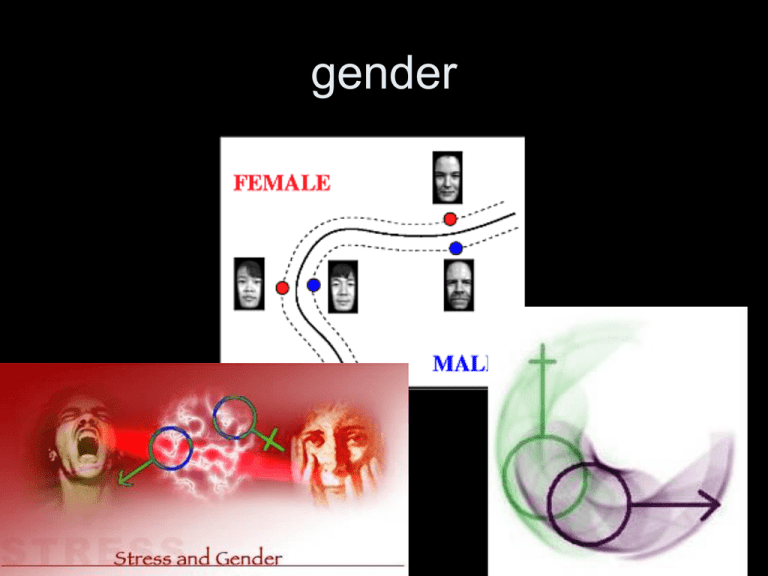
gender
gender
• Refers to the SOCIAL characteristics that
distinguish the sexes.
Social construction of gender
• The social
construction of gender
is a subtle and
complex process that
includes:
1. tangible
presentations of
people
Social construction of gender
• 2. a sexual division of labor between
women’s and men’s work
Social construction of gender
• 3. subtle behavioral and attitudinal
expectations
Gender is embedded in the social and
cultural heritage of a group
Individuals are introduced to gender as they
encounter differential expectations
Gender and Socialization
• Socialization is the
lifelong process of
learning to
become a member
of the social world,
beginning at birth
and continuing
until death
SOCIALIZATION
• Socialization is a major
part of what the family,
education, religion and
other institutions do to
prepare individuals to
be members of their
social world
socialization
• Interaction is the basic building
block of socialization….
• Out of the process of
interaction we learn culture and
become members of society
• Interaction shapes us into
human beings with social
selves (which are perceptions
we have of who we are)
socialization
• Socialization is
necessary not
only for the
survival of the
individual but
also for the
survival of
society and its
groups
SOCIALIZATION AND
THEORY
*most theories of socialization
focus on micro-level
processes (ie: how families,
peer groups etc. teach us
how to live in our respective
cultures….
* There are important macro
processes as well……….
SOCIALIZATIONFUNCTIONALISM
• (functionalist)
perspectives of
socialization tend to see
different levels of the
social world operating to
support each other (ex:
boy and girl scouts
stressing national
values/patriotism)
SOCIALIZATION-CONFLICT
THEORY
• Conflict theorists
believe that those who
have power and
privilege use
socialization to
manipulate individuals
in the social world to
support the interests
of elites
Socialization and Symbolic
Interactionism
• For symbolic interactionists
the central “product” of the
process of socialization is the
self…….
• The self refers to the
perceptions we have of who
we are
SOCIALIZATION-SYMBOLIC
INTERACTIONIST THEORY
• Throughout the socialization process our
“self concept” is derived from our
perceptions of the way others are
responding to us…
The self
• George Herbert Meadsymbolic interactionists
who felt individuals take
others into account by
imagining themselves in
the position of the other, a
process called “roletaking”…………
Mead and the Self
• The self develops only with
social experience
• *the self is not part of the
body and does not exist at
birth
• Mead rejected the idea that
personality is guided by
biological drives or biological
maturation
• *the self develops only as the
individual interacts with
others
Mead and the Self
• *the key to the development of
the self, is learning to take the
role of the other
• *infants respond to others
through imitation
• *as children learn to use
language and other symbols, the
self emerges in the form of playsignificant others
We are introduced to gender as we are exposed to
dissimilar treatment emphasizing differences
Differences between males and
females-sexual dimorphism
• Sexual dimorphism refers to marked
differences in male and female biology
besides the contrasts in breasts and
genitals
• Men and women differ not just in primary
and secondary sexual characteristics, but
in average weight, height and strength
How significant are these
differences??
The behavioral, attitudinal and status differences
between men and women emerge from culture
and society rather than from biology
Margaret Mead and Gender
• Anthropologist Margaret
Mead did early
ethnographic study of
variation in gender roles
(Sex and Temperament in
Three Primitive Societies)
• Work based on fieldwork
in three societies in
Papua, New Guinea:
Arapesh, Mundugumor,
Tchambuli
ARAPESH
MUNDUGAMOR
Tchambuli
Gender roles-tasks and activities
that a culture assigns to the sexes
Gender stereotypes-oversimplified but
strongly held ideas about the characteristics
of males and females
Gender stratification describes an unequal
distribution of rewards between men and women
reflecting their different positions in a hierarchy
Feminism
• Feminism-the view that
biology is not destiny and
that stratification by
gender is wrong and
should be resisted
• ARE YOU A FEMINIST?

